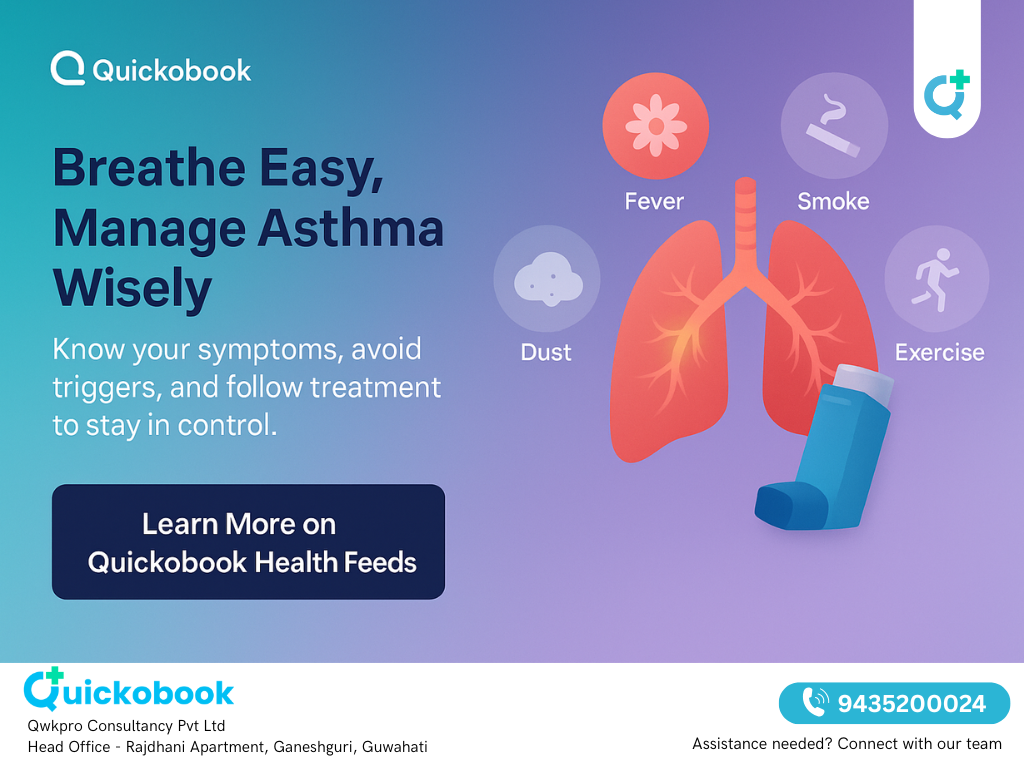Introduction
Asthma is a chronic condition that affects millions of Indians every year. It causes inflammation and narrowing of the airways, making it difficult to breathe. Although it can’t be completely cured, proper treatment and awareness can help you live a healthy, active life.
If you or someone in your family struggles with recurring breathlessness, coughing, or wheezing, understanding asthma’s signs and triggers is essential. With timely care from a pulmonologist or general physician, available easily on Quickobook, asthma can be managed effectively.
What Is Asthma?
Asthma is a long-term respiratory condition where your airways become swollen, sensitive, and filled with mucus. This narrowing makes it hard for air to move in and out of the lungs, causing breathing problems.
Asthma can affect people of all ages, but it often begins in childhood. It tends to run in families and may worsen with exposure to certain irritants or allergies.
Common Symptoms of Asthma
Asthma symptoms can vary in severity and frequency. Some people have mild symptoms occasionally, while others face daily challenges.
Key Symptoms Include:
- Shortness of breath — difficulty breathing, especially during exercise or at night.
- Wheezing — a whistling sound while exhaling.
- Chronic cough — often worse at night or early morning.
- Chest tightness or pressure — feeling like your chest is being squeezed.
- Fatigue or trouble sleeping — due to breathing difficulty.
If you notice these symptoms frequently, it’s important to consult a general physician or pulmonologist for proper diagnosis.
Types of Asthma
- Allergic asthma: Triggered by allergens like dust, pollen, or pet hair.
- Non-allergic asthma: Caused by stress, infection, or cold air.
- Exercise-induced asthma: Symptoms appear during or after physical activity.
- Occupational asthma: Triggered by workplace irritants such as smoke, chemicals, or fumes.
- Childhood asthma: Common in kids and often linked to family history or allergies.
Triggers of Asthma You Should Avoid
Asthma triggers can vary from person to person. Identifying and avoiding them is key to preventing flare-ups.
Common Triggers Include:
- Dust and air pollution — a major issue in many Indian cities.
- Pollen, mold, and pet dander.
- Cold air or sudden weather changes.
- Tobacco smoke and strong odors.
- Respiratory infections such as flu or bronchitis.
- Exercise without proper warm-up.
- Emotional stress or anxiety.
- Certain foods or preservatives like sulfites in dried fruits and packaged snacks.
Tip: Keep your surroundings clean, avoid smoking, and monitor air quality before stepping outdoors.
Diagnosis of Asthma
To confirm asthma, your pulmonologist or general physician may recommend:
- Medical history and symptom review
- Physical examination of lungs and breathing patterns
- Spirometry test: Measures how much air you can inhale and exhale
- Peak flow monitoring: Tracks daily breathing changes
- Allergy tests: Identify specific triggers
Early diagnosis is important for managing asthma effectively and preventing severe attacks.
Treatment Options for Asthma
Although asthma has no permanent cure, treatment can control symptoms and improve quality of life.
1. Inhalers (Primary Treatment)
Inhalers deliver medication directly to the lungs, providing quick relief and long-term control.
- Reliever inhalers: Used during asthma attacks (e.g., salbutamol).
- Preventer inhalers: Taken daily to reduce airway inflammation (contain corticosteroids).
2. Oral Medications
For moderate to severe cases, doctors may prescribe anti-inflammatory tablets or leukotriene modifiers.
3. Allergy Management
If allergies trigger your asthma, antihistamines or allergy shots may help.
4. Nebulization Therapy
Nebulizers convert liquid medicine into mist, ideal for children or severe attacks.
5. Lifestyle Adjustments
- Maintain clean indoor air quality.
- Exercise regularly but avoid overexertion.
- Manage stress with yoga or deep breathing.
- Keep your weight healthy — obesity can worsen symptoms.
Managing Asthma at Home
- Use inhalers exactly as prescribed.
- Identify and avoid your triggers.
- Keep emergency medicines handy.
- Monitor your breathing with a peak flow meter.
- Get flu and pneumonia vaccinations regularly.
- Schedule regular checkups with your pulmonologist.
READ ALSO: Signs Of Kidney Infection You Should Never Ignore
When to Seek Immediate Medical Help
Call your doctor or visit the hospital if you experience:
- Severe shortness of breath or wheezing that doesn’t improve with inhaler use
- Trouble speaking due to breathlessness
- Lips or face turning blue
- Tightness or pain in the chest
- Confusion or extreme fatigue
Quick action can save lives — book an emergency consultation with a nearby pulmonologist or general physician instantly on Quickobook.
50 FAQs About Asthma
Q1. What is asthma?
A1. Asthma is a chronic disease causing airway inflammation and breathing difficulty.
Q2. Can asthma be cured completely?
A2. No, but it can be managed effectively with treatment and lifestyle changes.
Q3. What are early signs of asthma?
A3. Wheezing, coughing at night, and shortness of breath.
Q4. Is asthma genetic?
A4. Yes, family history increases your risk.
Q5. What causes asthma attacks?
A5. Exposure to allergens, cold air, pollution, or infections.
Q6. Can asthma occur in adults for the first time?
A6. Yes, adult-onset asthma is becoming more common.
Q7. How is asthma diagnosed?
A7. Through lung function tests and symptom analysis by a pulmonologist.
Q8. What foods should asthma patients avoid?
A8. Avoid sulfite-rich foods, processed snacks, and cold drinks.
Q9. Can exercise help with asthma?
A9. Yes, moderate exercise improves lung capacity, but warm-up is essential.
Q10. How does air pollution affect asthma?
A10. Pollutants irritate the airways, causing inflammation and attacks.
Q11. What is a rescue inhaler?
A11. It provides quick relief during an asthma attack.
Q12. Is asthma dangerous?
A12. It can be, if left untreated or poorly controlled.
Q13. Can stress trigger asthma?
A13. Yes, emotional stress can worsen breathing difficulty.
Q14. How does asthma affect children?
A14. It can cause frequent coughing, especially at night or during play.
Q15. Can weather changes trigger asthma?
A15. Yes, cold or humid weather can narrow airways.
Q16. Is steam inhalation good for asthma?
A16. It can ease congestion but doesn’t replace medical treatment.
Q17. How often should I visit my doctor?
A17. At least every 3–6 months for checkups.
Q18. What is the difference between asthma and bronchitis?
A18. Asthma is chronic airway inflammation; bronchitis is often infection-related.
Q19. Can smoking worsen asthma?
A19. Yes, smoking damages airways and reduces medicine effectiveness.
Q20. What is the role of Quickobook in asthma care?
A20. Quickobook helps you book nearby pulmonologists or general physicians for consultation, treatment, or inhaler guidance.
Conclusion
Asthma doesn’t have to limit your life. With the right care, medication, and awareness of your triggers, you can breathe freely and live confidently.
If you experience frequent wheezing, shortness of breath, or chest tightness, don’t delay.
Book an appointment today with a trusted pulmonologist or general physician on Quickobook.com for expert guidance and long-term relief.
Disclaimer
This article is for educational purposes only and does not replace professional medical advice. Always consult a qualified pulmonologist or general physician for diagnosis and personalized treatment.










Comments (0)
No comments yet. Be the first to share your thoughts!
Leave a Comment